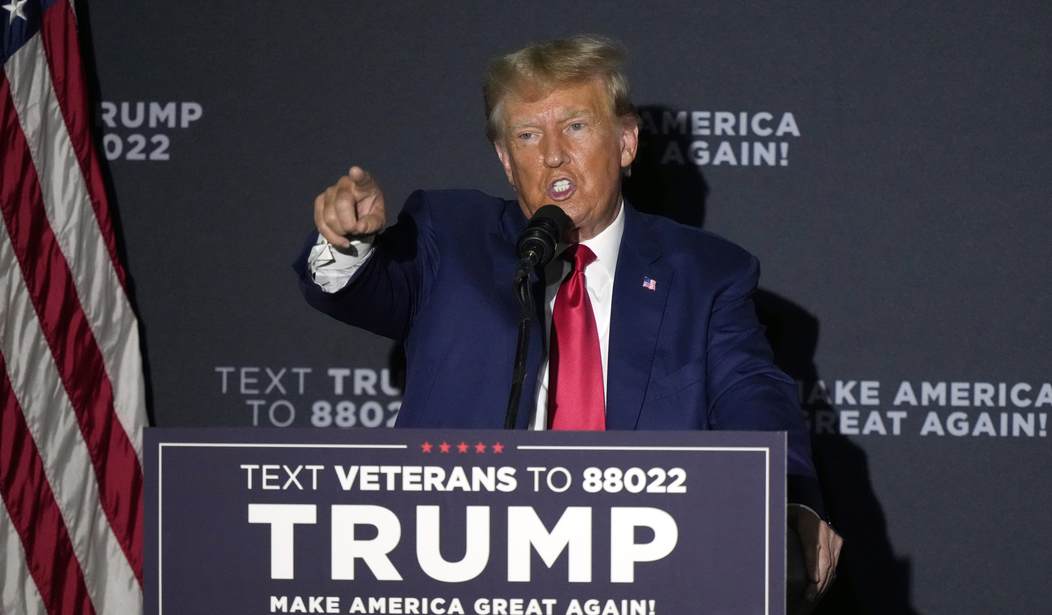A new Wall Street Journal national poll over the Labor Day weekend has shaken some observers' views of the 2024 Republican presidential campaign. The bottom line: It's no longer a two-man race between former President Donald Trump and Florida Gov. Ron DeSantis. Trump has pulled so far ahead, and DeSantis has fallen so far behind, that it is now inaccurate to characterize the two as locked in a head-to-head battle.
The numbers: Trump was the choice of 59% of poll respondents, while DeSantis was the choice of 13%. After DeSantis came former South Carolina governor and U.N. ambassador Nikki Haley at 8% and entrepreneur Vivek Ramaswamy at 5%.
In an earlier Wall Street Journal poll in April, Trump led DeSantis 48 to 24 -- a 24-point lead. Now, it's 59 to 13 -- a 46-point lead. "What was once a two-man race for the nomination has collapsed into a lopsided contest in which Trump, for now, has no formidable challenger," the Journal wrote.
There are no foreseeable events in the next few months that will change that dynamic. That means the possible game changers come next year, at two times. One is when voting starts with the Iowa caucuses on Jan. 15. The other is when the first of Trump's many criminal trials begins, possibly on March 4.
When the voting starts is when Republicans have to stop thinking about the race in terms of a distant decision and start thinking about it as a commitment they have to make right now. Sometimes, the preferences they have related to pollsters in the preceding months do not survive. For example, in 2007-2008, former New York Mayor Rudy Giuliani led the Republican race the whole way, from the earliest polls in February 2007 to the eve of the Iowa caucuses in January 2008. At that point, with voting underway, Giuliani collapsed. By Jan. 30, 2008, he was out of the race.
Recommended
But there are big differences between Giuliani then and Trump now. Giuliani was popular among Republicans as a former big-city mayor, but Trump is on an entirely different level as a former president and proven vote-getter with Republicans nationwide. There is simply no comparison between the two. Plus, Giuliani's biggest lead over the full field in the RealClearPolitics average of national polls was 14.6 points. Trump is currently up by 39.3 points -- a lead that has more than doubled in the last few months.
It seems clear at the moment that the far bigger threat to Trump is the coming legal onslaught. Right now, Trump's trial on federal charges relating to the 2020 election and Jan. 6 is scheduled to start in Washington, D.C., on March 4 -- the day before Super Tuesday. On March 25, his trial on charges brought by a local prosecutor in New York is scheduled to start. On May 20, his trial on federal charges related to his handling of classified documents is scheduled to begin in Florida. Unscheduled so far is the trial on charges brought by a local prosecutor in Atlanta over the 2020 election. And that does not count the various lawsuits that Trump will have to fight in 2024, as well.
It is hard to imagine now how taxing that schedule, or a similar schedule if some dates change, will be for a presidential candidate. The prosecutions will drain Trump's time, energy and money at a time when he will most need all three. And many of his supporters, energized by Trump's defiant stance toward his accusers, simply have not fully envisioned what will happen. Perhaps Trump himself hasn't, either.
In his interview last month with Tucker Carlson, Trump was asked, "How do you get indicted every week and stay cheerful?" "I think it is a lot easier because I'm so high in the polls," Trump answered, "because it means that people get it. The people see it's a fraud."
Maybe Trump can remain cheerful now -- although there are plenty of reports, supported by common sense, that suggest he is deeply upset by the indictments. And some of his supporters are thrilled by the public bravado he has shown in the face of one charge after another.
But think about next year. A thought: You know how Ukraine valiantly fought back when a vastly superior Russian force invaded in February 2022? Ukraine's grit led to cheers worldwide, lots of financial and military aid, and the hope that maybe, just maybe, the little guy could defeat the mighty Russian machine.
But there was no quick Ukrainian victory, even when Russian forces showed stunning incompetence. And then time dragged on. The Russian machine kept grinding and grinding and grinding. Now the best one can say of Ukraine's position is that it is holding on. The firepower and numerical superiority of Russia has, in time, ground down Ukrainian defenses.
Back to the subject: Trump supporters cheer as he resists one indictment after another. Look, they say, his support is rising, even as Democratic district attorneys and Biden special counsels throw everything they have at him! Is it possible that he could defeat the mighty prosecution machine?
Well, next year is the year when time drags on and the machine keeps grinding and grinding and grinding. Perhaps Trump can hold on, but the toll will be terrible. The prosecution machine will impose crippling costs on Trump's daily life, on his campaign, on his bank account. It would not be surprising to see him spend everything he has raised for his campaign on his legal bills instead. And in the end, with four indictments and 91 felony counts so far, the machine will convict him of something, perhaps a lot of things.
What will that do to Trump's support? Certainly many of his most devoted supporters will become even more devoted as they watch the spectacle of his trials. But other, less devoted supporters might well be ground down along with Trump. At some point, they might decide it's just not worth it. Trump's adversaries, they will realize, will never, ever quit. Should they, his supporters, keep fighting?
So yes, Trump has a huge lead today, so much so that the Republican nomination race no longer seems to be a contest. But 2024 is coming. Perhaps Trump will manage to maintain his dominance in the GOP even then. But it will be an ugly, protracted and unimaginably costly fight.
This content originally appeared on the Washington Examiner at washingtonexaminer.com/opinion/with-visit-biden-makes-things-worse-on-border.
(Byron York is chief political correspondent for The Washington Examiner. For a deeper dive into many of the topics Byron covers, listen to his podcast, The Byron York Show, available on the Ricochet Audio Network at ricochet.com/series/byron-york-show and everywhere else podcasts are found.)

























Join the conversation as a VIP Member